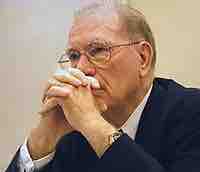All electoral politics are interest politics in some sense. Over the course of American history, a number of interest groups have sought out electoral politics as a means of gaining access and influence on broader American policies. One example of an interest group using electoral politics is the National Caucus of Labor Committees (NCLC).
The NCLC is a political cadre organization in the United States, founded and controlled by political activist Lyndon LaRouche, who has sometimes described it as a "philosophical association. "

Lyndon LaRouche
LaRouche was the leader of the National Caucus of Labor Committees, an interest group that later developed a distinct political party that nominated LaRouche for president of the U.S.
LaRouche is the NCLC's founder and the inspiration for its political views. (For more information on these views see the article "Political Views of Lyndon LaRouche," as well as the main article titled "Lyndon LaRouche. " An overview of LaRouche's organizations is in "LaRouche movement. ") The highest group within the NCLC is the "National Executive Committee" (NEC), described as the "inner leadership circle" or "an elite circle of insiders" that "oversees policy. " The next most senior group is the "National Committee" (NC), which is reportedly "one step beneath the NEC. "
In 1972, the NCLC launched the U.S. Labor Party (USLP), a registered political party, as its electoral arm. In 1976, they nominated LaRouche for President of the United States on the Labor Party ticket, along with numerous candidates for lower office. In 1979, LaRouche changed his political strategy to allow him to run in the Democratic primaries, rather than as a third party candidate. This resulted in the USLP being replaced by the National Democratic Policy Committee (NDPC) a political action committee unassociated with the Democratic National Committee.